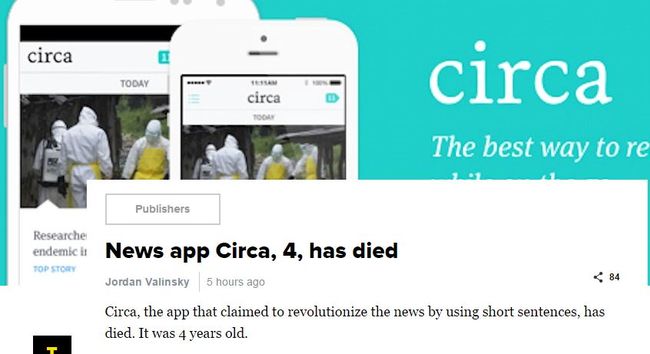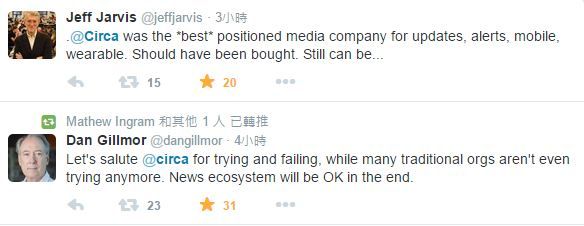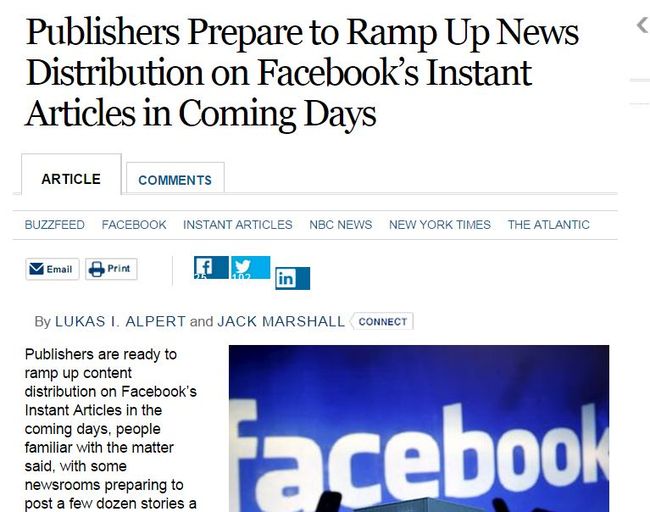短新闻APP Circa 关门大吉,Facebook 的 Instant Aricles 即将正式海量来袭,这本来是两件互不相关的事情,但是,却同时发生了。这是偶然,也是必然。因为两者之间的确存在因果关系,虽然在时间上纯属巧合。
有影响力的新闻业咨询师 Alan Mutter 就此接受 Digiday 采访时评论说:任何做新闻应用的人,都在遭受 Facebook、 Apple、 Google 等大网络平台的踩踏;他们是 Flipboard 的杀手,Circa 的杀手, Ozy 的杀手。
高调登场的 Facebook 重头产品 Instant Articles 5月12日推出以来十分低调。9家媒体伙伴只有5家各发了一篇,四家还没有开张。这个在传统媒体、新兴媒体中“民愤”不小的项目,怎么了?Business Insider 在6月8日的报道中冷嘲热讽。当时我就认为,BI 的评论也许太早了一点,有消息说,Instant Articles 6月底可能全面登场,当然,也是猜的。现在,正式的消息来了。华尔街日报的消息说,这两天,很可能就是周四,成吨的 Instant Articles 即将上线。纽约时报每天将发30篇,NBC news 将发30至40篇,Atlantic 将把自己的大部分内容都发上去。
再说 Circa ,这个创办四年的新闻应用,曾获得了800万美元的融资,其创新的新闻理念曾博得一片喝彩。但是,好景不长,钱花光了,不久前 Circa 公开寻求买家。Twitter 等一众新兴媒体机构表现了兴趣,但都不了了之。
这与今年3月奥姆·马利克的著名科技新闻博客网站 GigaOM关门,5月莫博士的 著名科技新闻网站 Recode 因难以为继只能卖给 VOX等负面消息一起,引起了人们的广泛关注。
News app Circa, 4, has died
Jordan Valinsky , Digiday
Circa, the app that claimed to revolutionize the news by using short sentences, has died. It was 4 years old.
Survived by its co-founders Matt Galligan, Ben Huh and Arsenio Santos, the news app had been on life support since April when it was revealed that it was looking for prospective buyers. It died on Sunday when it published its final story about endangered porpoises. The cause of death was determined to be lack of funding.
The family announced the deaththis afternoon on Medium, writing it’s being put on “indefinite hiatus.”
Advertisement
Circa admitted that it could no longer afford its large staff to write small pieces of news. “Our ongoing plan was to monetize Circa News through the building of a strategy we had spent a long time developing but unfortunately we were unable to close a significant investment prior to becoming resource constrained,” wrote Galligan.
Circa launched with high hopes of revolutionizing the news. “We’re trying to make it so that people educate themselves for five minutes as opposed to play Angry Birds,” Galligan told TechCrunch in 2011.
The app raised $8 million and won a lot of awards, including Best App of 2013 by Apple and Google. This year looked to be Circa’s biggest year yet with the company promising to make money by introducing native ads to the app.
News of its passing was first announced by Fortune, which reported that Circa had run out of money, underscoring how difficult it is to make news on mobile work and be profitable.
“The problem with Circa is, it was an elegantly executed point solution, but it was not compelling,” news consultant Alan Mutter told Digiday. “They advanced the ball a few yards in tracking what the reader’s already read. But that one little innovation wasn’t enough to make it compelling. Anyone that’s in the news app business has just been big-footed by the big online platforms, Facebook, Apple, Google. These are Flipboard killers, Circa killers, Ozy killers.”
Even though were rumors of interested buyers, a guardian angel never materialized.
Services are currently being held on Twitter, where mourners are paying their respect.
Get ready to start seeing a ton more Facebook Instant Articles on your newsfeed
JILLIAN D'ONFRO , Business Insider
JUN. 24, 2015, 4:25 PM
Scott Olson / Getty ImagesFacebook CEO Mark Zuckerberg not reading a Facebook Instant Article
Get ready to see way more "Facebook Instant Articles" on your newsfeeds soon.
Facebook launched itsmuch discussed publishing product— designed to let media companies post their articles directly to its iOS app — in early May, but only five have articles have gone live so far.
But that's about to change.
Publications like The New York Times and The Atlantic are about to start publishing dozens of stories a day, sources toldLukas Alpert and Jack Marshall at The Wall Street Journal.
Facebook boasts that the new formatloads stories on mobile phones up to ten times fasterthan if readers click a link and head over to a publisher's website.
The media industry threw a tizzy around the initial launch, debating whether Instant Articles were a curse or a blessing to online news.
With Facebook giving publishers 100% of revenue from ads appearing inside articles — and taking 30% of revenue for the ads Facebook sells against them — optimists in the media business saw it asone more way to increase readers and revenue.
Critics saw it as a dangerous concession that being adestination site for readers isn't importantand worried that Facebook would change its revenue split model to the detriment of publishers.
The innovation and strategy editor at The New York Times, Kinsey Wilson, told Alpert and Marshall that his site plans to sell its own ads, rather than having Facebook sell them.
From the beginning, Facebook didn't give a concrete timeline for its Instant Articles roll-out plans, but said it wanted to use feedback from the first publishers to makeimprovements and updates to its format and guidelines. It looks like we're finally going to start seeing the product in action.
Publishers Prepare to Ramp Up News Distribution on Facebook’s Instant Articles in Coming Days
By LUKAS I. ALPERT and JACK MARSHALL , The Wall Street Journal
Jun 24, 2015 , 2:55 pm ET
Publishers are ready to ramp up content distribution on Facebook’s Instant Articles in the coming days, people familiar with the matter said, with some newsrooms preparing to post a few dozen stories a day.
The New York Times is ready to publish about 30 articles per day directly to Facebook’s news feed and the Atlantic is prepared to make most of its content available through the program, the people said. Both outlets are prepared to start publishing as early as Thursday, but are waiting for when Facebook is ready. NBC News plans to post between 30 and 40 articles a day to the stream in the coming days, one of the people familiar with the matter said.
“We’re excited for the next phase. At the outset we’ll be putting most of our content into the feed and will closely monitor the effect,” said Bob Cohn, president and chief operating officer at the Atlantic. “We are ready to change how much we make available.”
BuzzFeed intends to publish as much content as possible to the Facebook stream, according to Chief Executive Jonah Peretti. At first, Facebook has said it plans to make the articles visible to only select groups of users to see how they react, according to Mr. Peretti.
A Facebook spokeswoman said the program will begin soon, but declined to provide further details. Several publishers did single-article trial runs in May.
By publishing articles directly to Facebook through Instant Articles instead of linking back to their own websites, publishers hope to increase the exposure of their content on the social networking service, especially on mobile devices, and improve load time. Under Facebook’s new program, publishers will get to keep 100% of revenue brought in from ads that they sell and 70% if Facebook sells the ad.
The Atlantic has already signed up AMC’s upcoming sci-fi TV show “Humans” to advertise alongside its Instant Article offerings, said Mr. Cohn.
Kinsey Wilson, the New York Times editor for innovation and strategy, said the paper intends to sell all the ads running with its stories itself, rather than having Facebook sell the ads.
“We believe we can command a rate similar to what we get for an ad on our own site,” Mr. Wilson said.
Facebook created a media stir in May when it announced it was partnering with nine major news organizations for Instant Articles.
The program has caused widespread anxiety about Facebook’s intentions asnewsrooms grow increasingly reliant on the social-media giant for referral trafficand as they seek ways to increase mobile advertising revenue. Last year, Facebook commanded 35% of the mobile display ad market, according to eMarketer.
On May 13, five companies — including BuzzFeed, the Times and National Geographic — each published one story directly on Facebook to much fanfare, but since then no other Instant Articles have appeared.
At the time of the initial launch, Facebook heralded the program as a breakthrough that woulddramatically speed load times for storiesand would give publishers broader audiences. But several weeks later, Facebook said the first day’s stories were just a “slow launch” and that the full program would kick off later after the company and publishers had gathered feedback on the impact of the initial trial.
Some questioned whether the apparent delay meant there had been problems with the launch, but Facebook insisted that thegradual rollouthad been the plan all along.
Eventually, Facebook plans to give news organizations the ability to publish Instant Articles whenever they want. NBC has set it up so that publishing to Facebook won’t involve “doing anything differently” than publishing to its own site, a person familiar with the matter said. BuzzFeed has said it plans to link the social-media feature to its own publishing technology to enable it to push its content to Facebook Instant Articles with the click of a button.
Other early-stage partners include the Guardian, BBC News, Spiegel Online and Bild. Facebook has also been in discussions with other publishers about testing the product.


